Best External Hard Drive 2020: 9 USB hard disks tested
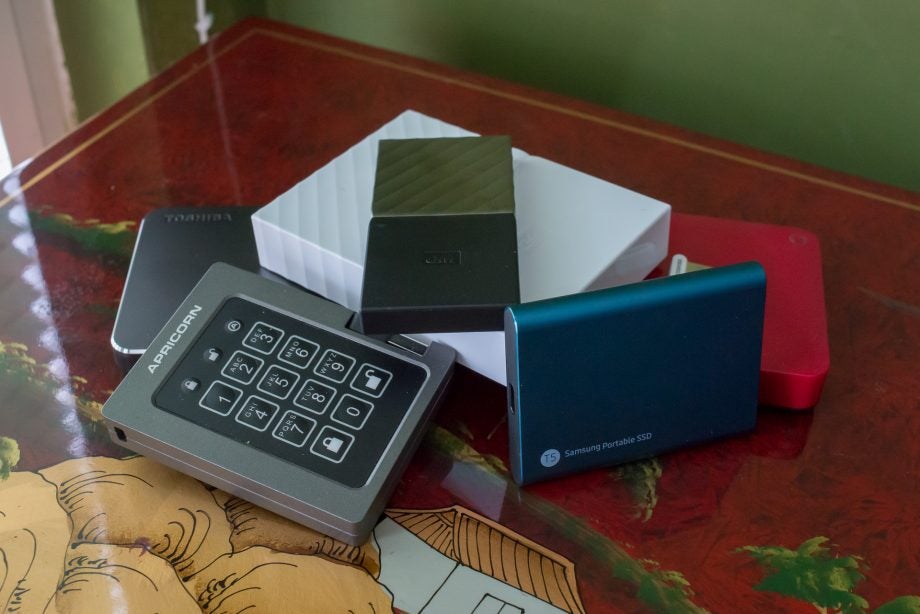
What’s the best external hard drive? We test nine popular USB models from big manufacturers to see how they stack up.
Despite fast internet connections and cheap cloud storage plans, an external hard disk is still often the easiest way to transfer lots of files. And, even if you’re not copying files between computers, an external hard disk makes it easy to store backups of important files or have access to the data you need on the move.
The good news is that external hard drives have moved on a lot since the early days. You’ve now got a huge choice of disk, depending on the capacity you need and speed you require.
What type of external hard drive do you need?
The basic choice you have to make is hard disk or SSD? Traditional hard disks are a lot cheaper per gigabyte, so make sense if you need a load of storage and don’t want to pay a fortune for it. The downside is that mechanical hard disks are quite slow and they’re not as rugged.
SSD-based external hard drives have solid state storage in them. They’re more expensive than their mechanical counterparts, but they’re faster and more robust. And, because solid-state storage takes up less room than mechanical platters, these types of external hard drive can often be smaller, too. The main downside is that you pay a lot more per gigabyte, so you’re likely to end up with less disk space overall.
Which interface should you go for?
External hard drives are rated by the speed of their interface. All modern drives will have USB 3.0 support or USB 3.1 Gen 1 support. Both standards allow for a maximum throughput of 5Gbps. Newer drives will support USB 3.1 Gen 2, which allows for 10Gbps.
Don’t be fooled by the speed of the USB interface, as the actual transfer speeds differ between devices. Typically, hard disks can use the USB 3.0 speeds, but SSD external hard drives benefit from the faster USB 3.1 Gen 2 speeds. You may find that USB 3.1 Gen 2 devices comes with a USB Type-C connector cable, although an adaptor will be provided in the box so that you can use the old USB Type A connector, which is typically found on the back of your computer.
To make the most of a drive, you need to plug it into the same type port on a computer. Don’t worry, as USB is backwards compatible, all the way down to USB 2.0. The only downside is that you only get the throughput speed of the lowest-rated USB port. For example, plug a USB 3.1 Gen 2 device into a USB 2.0 port and you’ll see throughputs of 480Mbps only.
How we test external hard drives
We use the ATTO Disk Benchmark and CrystalDiskMark benchmarks to test the throughput of each drive, using a variety of file sizes. Sequential read and write routines test the raw throughput of the drive, which you would see if you were copying large files to and from a drive. The random read and write tests gives a more realistic approach to backing up or copying smaller files, as you may do in real-world usage.
Samsung T5
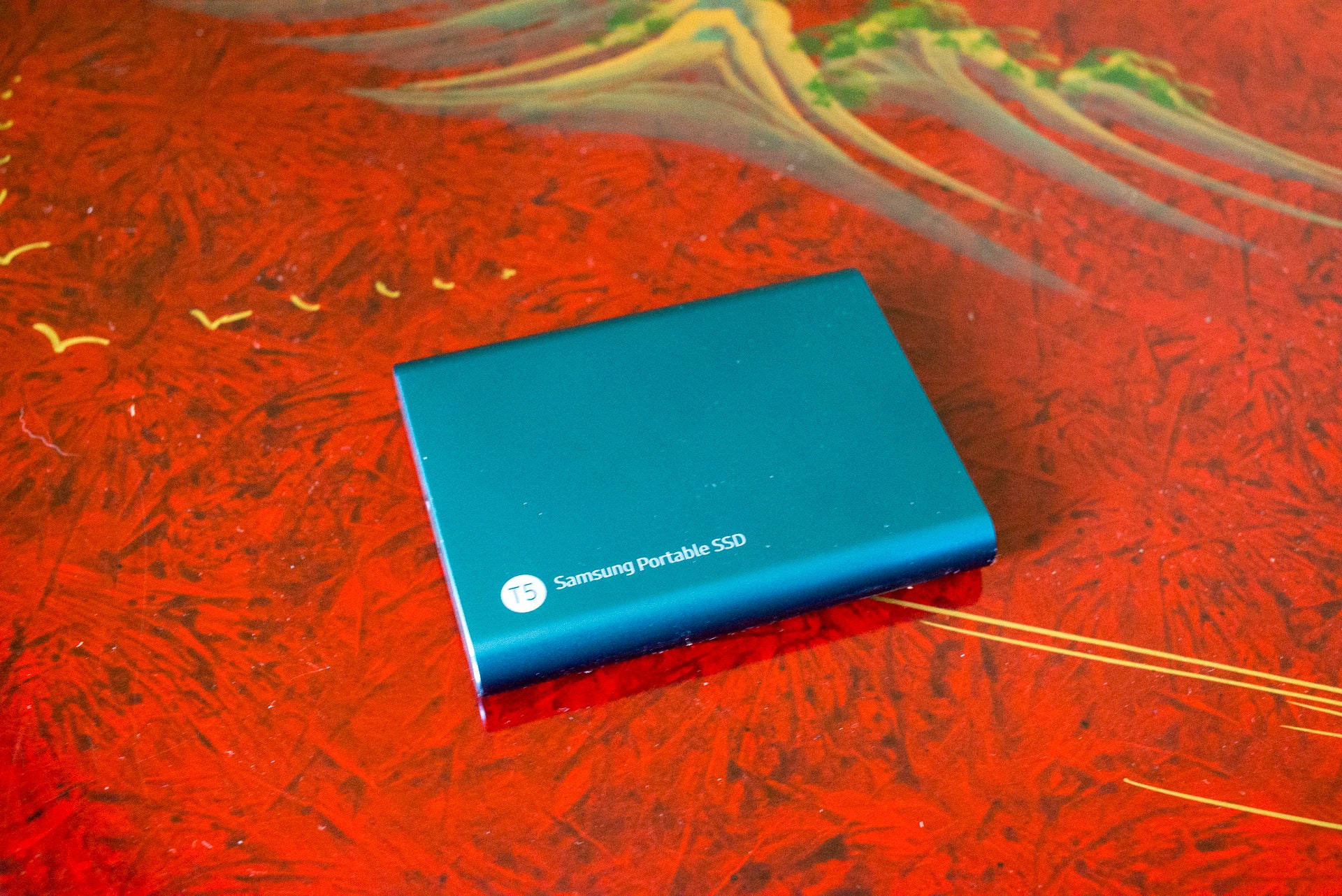
Key features:
- Available in 250GB, 500GB, 1TB and 2TB capacities
- Three year RTB warranty
- Review price: £170 (500GB)
Samsung’s well-known for its super-fast internal SSDs, but the T5 shows that it can turn out lightning-fast external hard drives, too.
Given that SSDs don’t have to be very big, Samsung has made the T5 tiny, and it will easily fit in the palm of your hand (74x57x10.5mm). It’s a gorgeous-looking external drive, too, with a curved metal case that comes in blue or black.
As the T5 is brand-new, it has a USB Type-C connector that supports USB 3.1 Gen2 speeds of up to 10Gbps. In the box you get both a USB-C cable and USB Type-C to USB Type-A cable, so you can connect the T5 up to any computer.
Samsung needs the faster USB Gen2 interface, as the drive is capable of transfer speeds of up to 540MBs. So, how quick is it really?
Testing with CrystalDiskMark, we saw sequential read speed of 553.6MBps and write speeds of 518.6MBps. That’s pretty much the same kind of speed as you’d get from an internal SATA-based SSD. The tougher random test pushed the T5, but read speeds of 298.5MBps and write speeds of 203.2MBps shows how quick this drive really is.
Switching to the ATTO Disk Benchmark, we saw similar results. At file sizes of 64KB and larger read speeds were between 535MBps and 560MBps; write speeds were between 498MBps and 533MBps. With ATTO, only the tougher smaller file tests affected performance, with read speeds of 76.96MBps and write speeds of 76.65MBps when using 2KB file sizes.
The Samsung T5 drive comes in 250GB, 500GB, 1TB and 2TB. If you need super-fast external storage, up to a capacity to compete with mechanical drives, then the T5 is for you. However, the drives are comparatively expensive and you can get better value drives if you’re willing to sacrifice some performance.
WD My Passport SSD
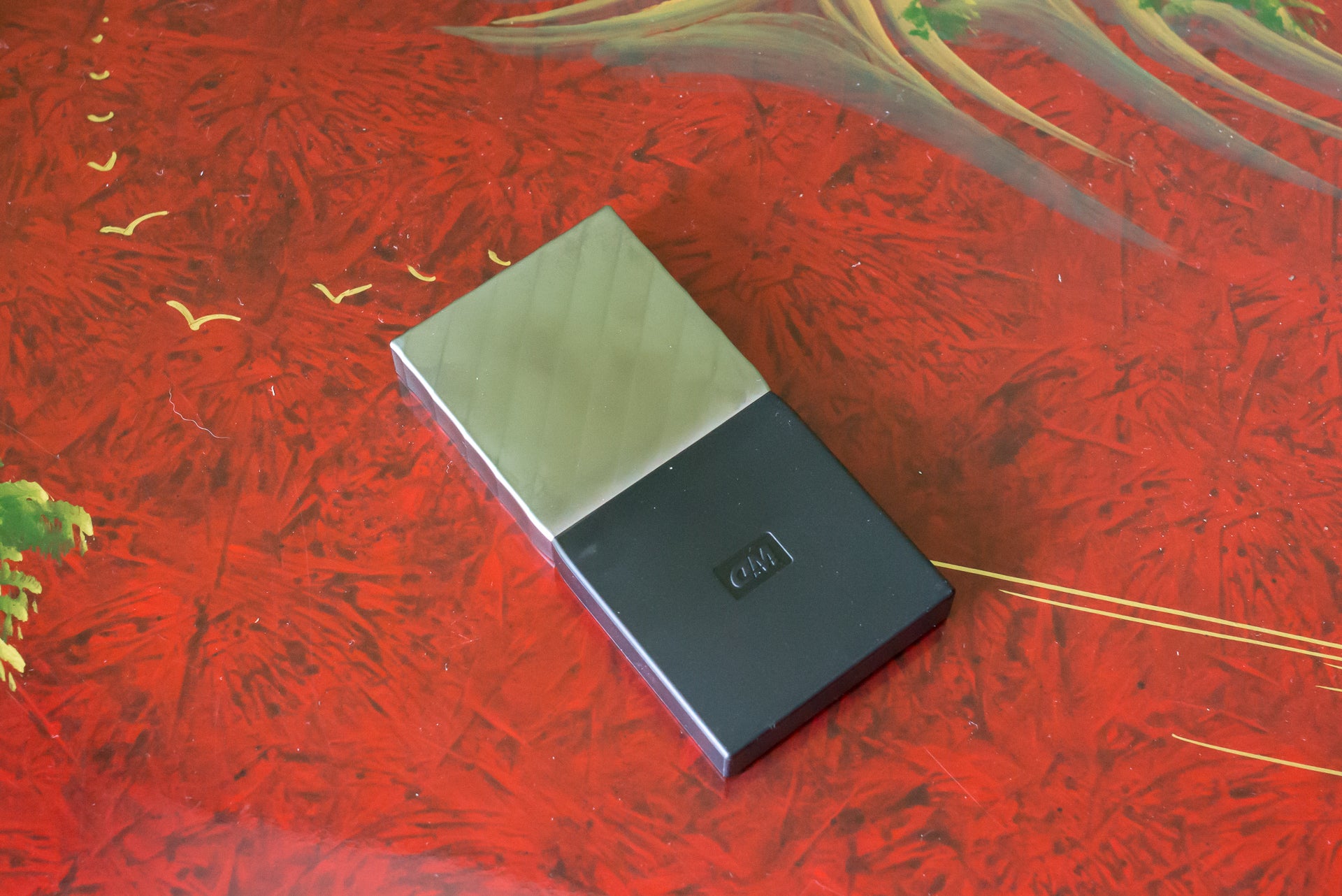
Key features:
- Available in 256GB, 512GB and 1TB capacities
- Three year RTB warranty
- Review price: £110 (256GB)
Better-known for its mechanical hard disks, WD has expanded out to include the My Passport SSD external hard drive.
As SSDs take up a lot less space than mechanical drives, WD has cut the size of the My Passport SSD down, and it measures just 90x45x10mm. The neat textured top looks great, too, and you buy the drive in black or white.
At the rear of the drive is a USB-C port, which supports the USB 3.1 Gen 2 standard for a maximum throughput of 10Gbps. In the box, you get a USB-C cable, although there’s a Type-C to Type-A adaptor so that you can connect the drive to different USB ports.
Testing how fast the drive was, we saw CrystalDiskMark produce sequential read speeds of 424.7MBps and write speeds of 429.8MBps. Switching to the tough 4K random tests, speeds dropped to 27.54MBps read and 34.63MBps write.
It was a similar story with the ATTO Disk Benchmark. At file sizes between 256KB and 64MB, we saw read speeds of between 468MBps and 485MBps. With 2KB file sizes, the My Passport SSD struggled a little more and managed read speeds of 19MBps and write speeds of 18MBps. These aren’t bad speeds and, for copying an array of normal files, the My Password SSD is more than quick enough.
Available in 256GB, 512GB and 1TB capacities, there’s a wide choice available at good prices. But, the faster Samsung T5 is only marginally more expensive, so stretch to that drive if you can.
Toshiba U364
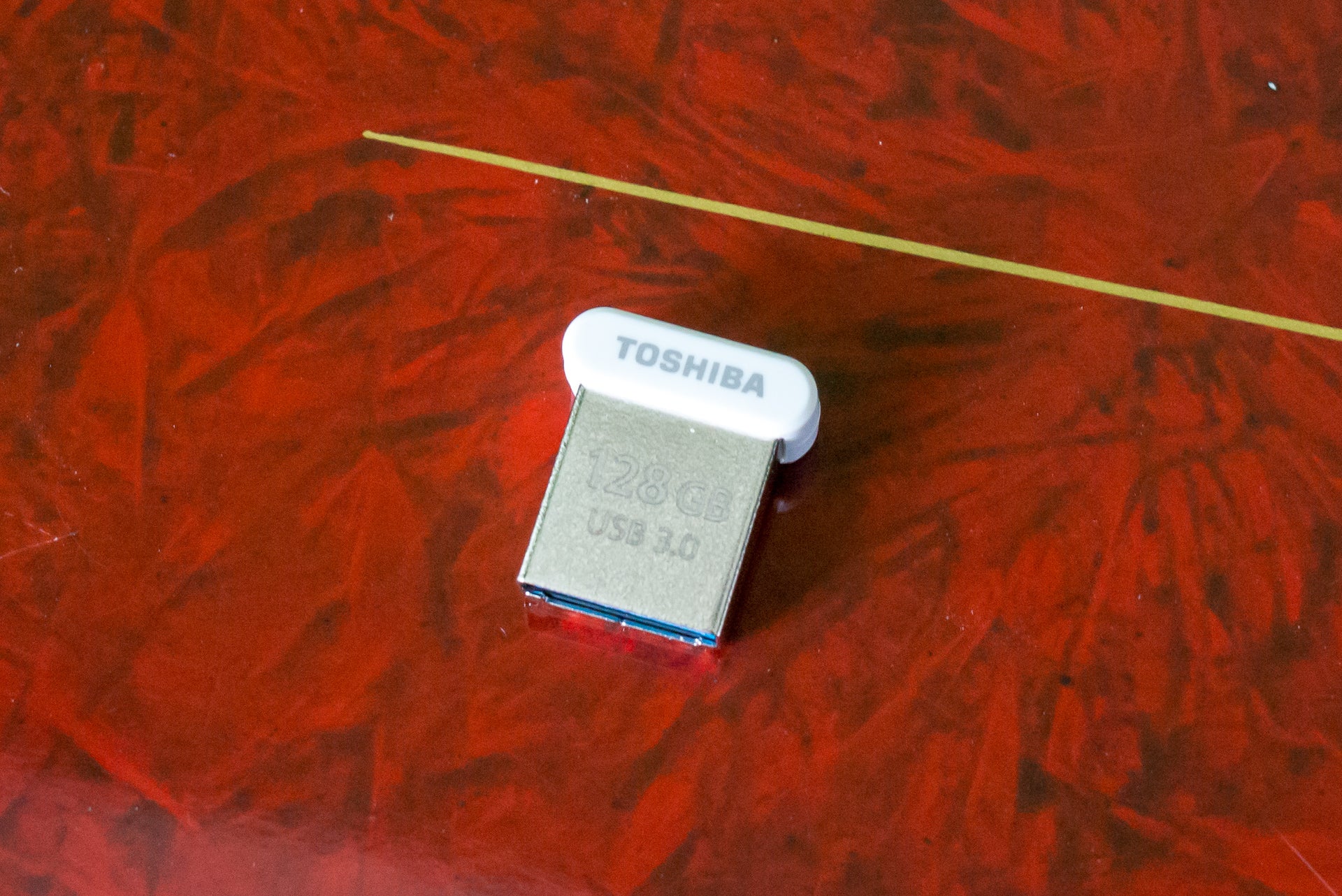
Key features:
- Available in 32GB, 64GB and 128GB capacities
- Five years RTB warranty
- Review price: £40 (128GB)
If you’ve got a laptop that you’d like to add some semi-permanent storage to, the Toshiba U364 could be for you. Barely bigger than a USB Type-A port, this external hard drive can be plugged into a computer and left in place (17x15x6.8mm). Of course, you can also use it as an extremely small external hard drive, slipping it into a wallet when not in use.
With a USB 3.0 port, the drive is rated for a maximum transfer rate of 120MBps. Putting the drive through CrystalDiskMark, it produced read speeds of 91.87MBps and write speeds of 24.33MBps. Switching to the 4K random read/write test, really pushed the drive to its limits, with a read speed of 10.46MBps, but a write speed of just 0.003MBps.
It’s a similar story with the ATTO Disk Benchmark, which showed the drive as capable of read speeds between 85MBps and 93MBps with file sizes between 16KB and 64MB. With 2KB file sizes, read performance dropped to 19.12MBps and write performance to just 0.008MBps.
For larger files, the U364 is a handy way of transporting lots of files, or for expanding laptop storage, say to store more videos and photos. There’s also the Toshiba U363, which is the same type of drive, only in a more traditional thumb drive format. If you don’t need the semi-permanent storage, there are faster drives available in larger cases.
Buffalo MiniStation Velocity
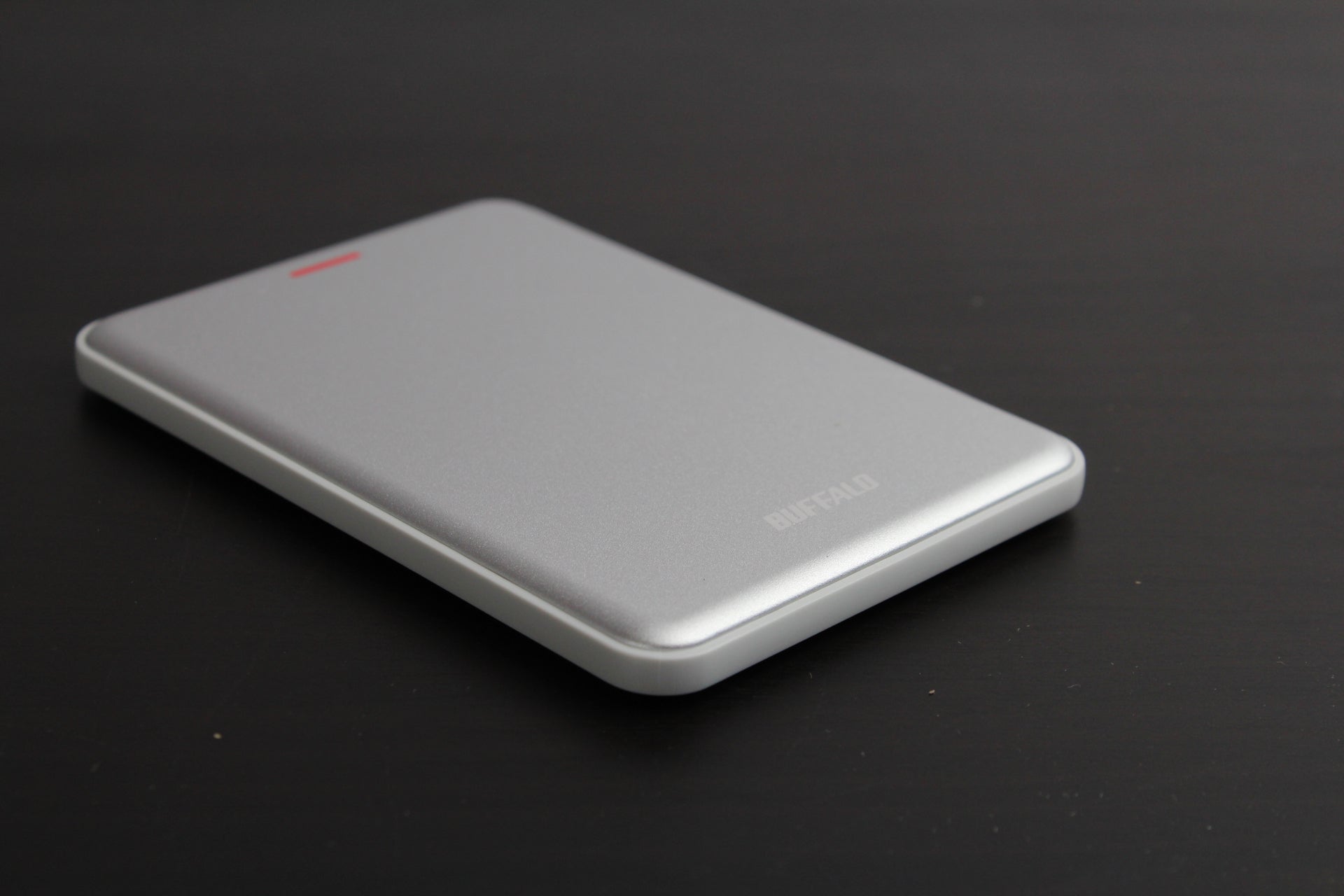
Key features:
- £198 for 480GB
- USB-C 3.1 Gen-2 speeds
- SSD storage
Surprisingly, there are few external SSD drives on the market. Cost effectiveness is probably the main reason, since the flash memory in SSDs is considerably more expensive per GB than the spinning platters in hard disks.
For the same money, you get far less storage on an SSD, and since most people buy an external drive for backup, much of this market consists of mechanical storage that offers high capacity, rather than solid-state technology.
But thanks to much quicker access times, SSDs are considerably faster than any hard disk, whether inside a PC or in an external casing. That makes a drive such as the Buffalo MiniStation Velocity uniquely useful. If you’re willing to pay for it, it provides a way to run applications, edit large media files or even run an entire Windows installation off an external device with no real loss of performance; something that can’t be said of hard disks.
The same is true of Samsung’s T3 external SSD, putting these two similarly priced drives head-to-head for the user who wants maximum performance from external storage.
The Buffalo isn’t quite as diminutive as Samsung’s T3, nor as eye-catching. A slim silver casing that’s 8.8mm high, distinguishable only by a single red LED, makes for a rather Plain-Jane appearance.
Buffalo offers three storage tiers – 240GB, 480GB and 960GB – with some quite eye-watering pricing for the larger capacities when compared with external hard disks. The 960GB version costs over £400, while the 480GB commands a £150 premium, comparable with a 4TB hard disk. For pure backup, hard disks clearly still offer far better value for money.
Buffalo’s SecureLock Mobile and DiskFormatter 2 tools work well for drive encryption and partitioning, but these aren’t supplied with the drive; you’re provided a link to download them.
Performance-wise, the Buffalo MiniStation Velocity does impress, comfortably beating every external hard disk we’ve tested by some margin. It managed large file read and write speeds of 370MB/sec and 373MB/sec respectively, and we saw a superb 506MB/sec reading in the CrystalDiskMark burst speed test.
It falls back slightly with small files, however, reading at 164MB/sec and writing at 173MB/sec. Once again, these speeds beat hard disk performance, but fall behind in the SSD race against the similarly priced Samsung T3.
This relegates the Buffalo MiniStation Velocity to second place in the race for external drive performance, especially given its slightly higher pricing than Samsung’s offering.
Toshiba Canvio Premium
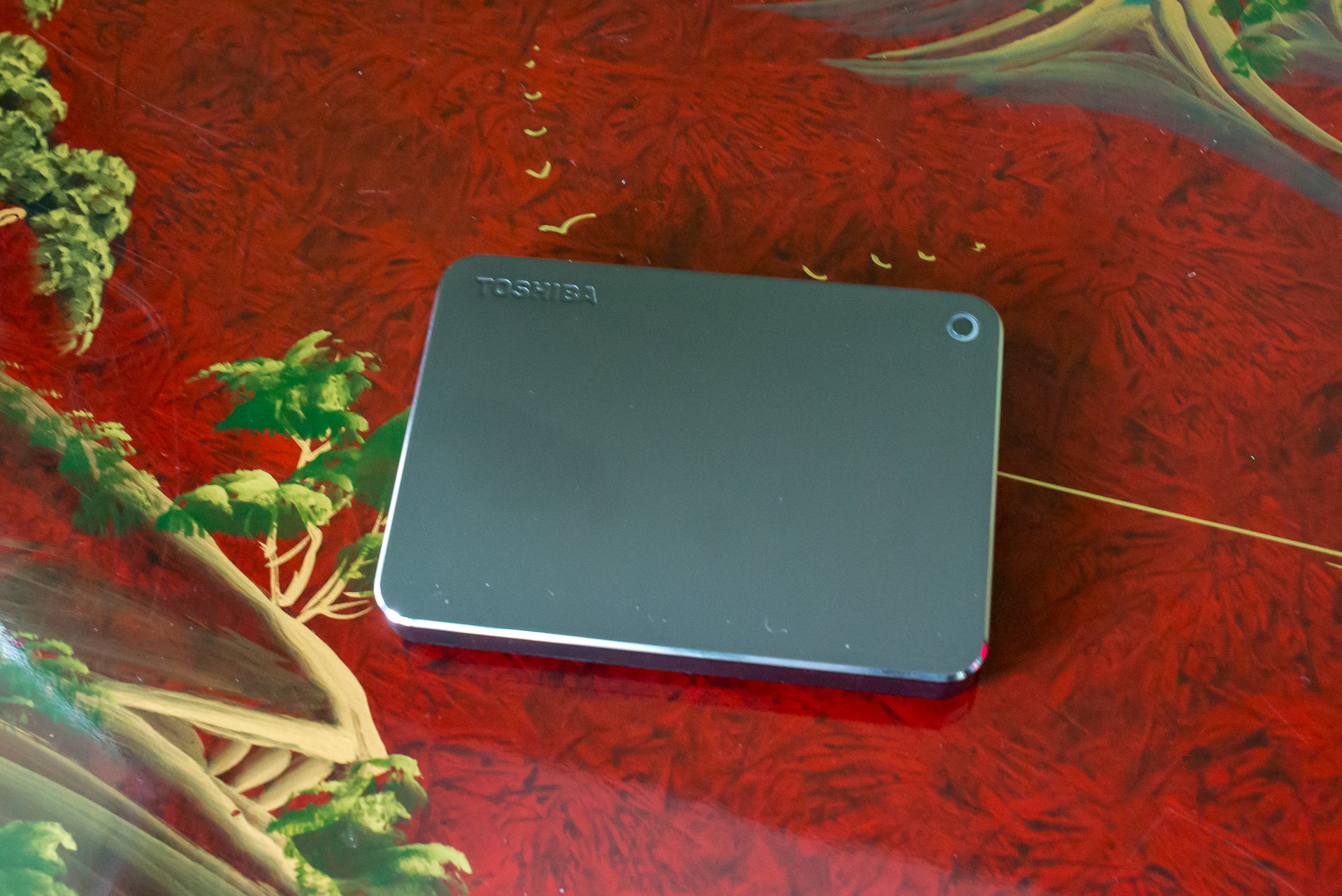
Key features:
- Available in 1TB, 2TB and 3TB capacities
- Three years RTB warranty
- Review price: £80 (2TB)
Toshiba’s brand-new Canvio Premium external hard drive uses a mechanical disk, showing that there’s life in the format yet. The aim with this drive was to make it compatible with the latest computers and push performance to the limit.
To that end, the drive has a USB 3.0 port, but its ships with a USB-C adaptor in the box. While this will do nothing for speed, it makes it easier to connect the Canvio Premium to a modern computer, particularly a slim laptop that doesn’t have traditional USB ports.
Performance of the drive, while behind that of an SSD, is excellent for a mechanical drive. CrystalDiskMark sequential test, the drive managed read speeds of 150.2MBps, and write speeds of 155.8MBps. The tough 4K random test is really tough for hard disks, and the Canvio Connect II suffered a little, managing 0.59MBps in the read test and an impressive 6.84MBps in the write test.
In the ATTO Disk Benchmark, the drive managed a consistent read speed of around 151MBps and write speed of around 155MBps with file sizes between 64KB and 64MB. With smaller 2KB files, performance was still good with write speeds of 10.14MBps and read speeds of 16.52MBps.
If you want the best combination of storage, price and performance, the Canvio Premium is the drive to buy, but you can save money with slightly slower mechanical drives. For the best performance, buy an SSD.
Toshiba Canvio Connect II
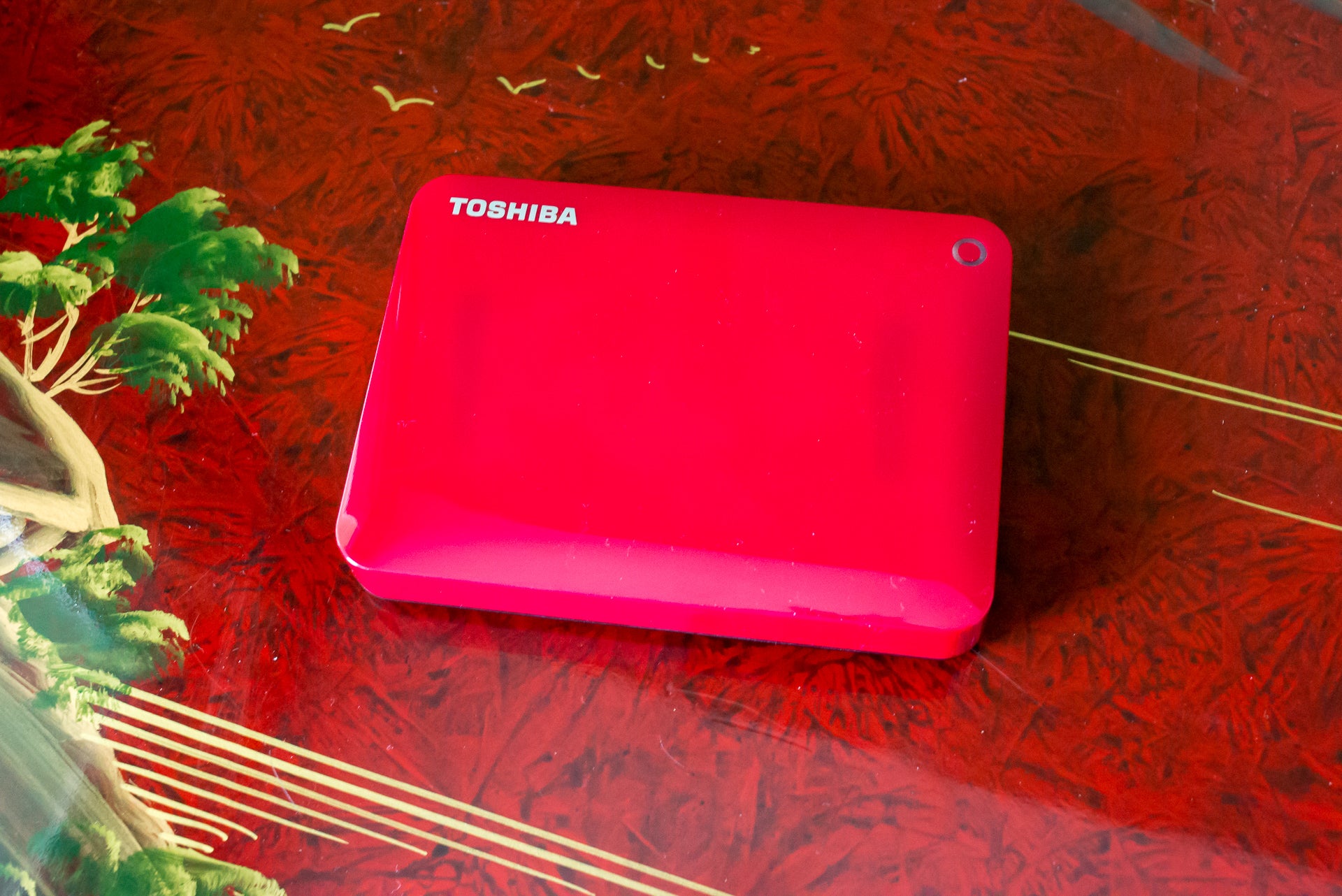
Key features:
- Available in 500GB, 1TB, 2TB and 3TB capacities
- Two years RTB warranty
- Review price: £81 (3TB)
If you care more about capacity and price than you do about performance, a mechanical external hard drive is the route to go. Few come better than the excellent Toshiba Canvio Connect II.
The drive gets its name from the free 10GB of cloud storage, but that’s not particularly interesting, as there are better cloud options. What really counts is that this drive is extremely well priced for all capacities
Look out, as the Canvio Connect II’s price varies by colour: the 3TB blue drive available for £81, but the same drive in black was £93.
A USB 3.0 port powers the drive, with a cable provided in the box. That’s plenty of speed for a mechanical drive, and there’s no need for a faster USB 3.1 Gen 2 port.
In the benchmarks, the Canvio Connect II showed itself to be a decent performer. In the CrystalDiskMark sequential test, the drive managed read speeds of 138.4MBps, and write speeds of 138.6MBps. The tough 4K random test pushes mechanical disks, and the Canvio Connect II suffered a little, managing 0.55MBps in the read test and 1.375MBps in the write test.
In the ATTO Disk Benchmark showed similar results, with file sizes of 32KB to 64MB showing read and write speeds of around 135MBps. 2KB file sizes dropped read and write speeds to 16MBps.
Even so, that’s good for a mechanical hard disk and particular for one at this price. For taking lots of files on the move, the Canvio Connect II is a great choice.
LaCie Rugged USB-C
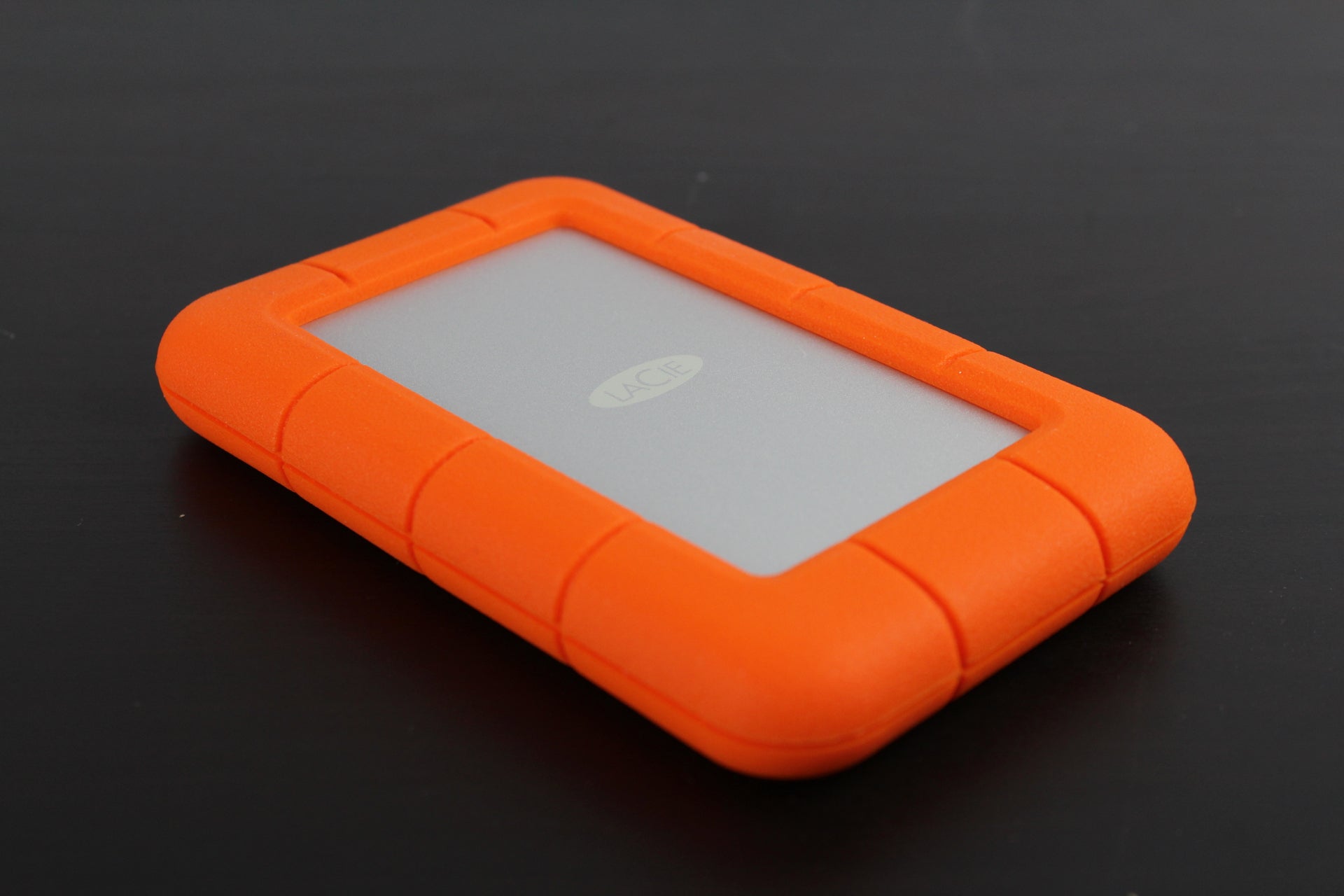
Key features:
- £179.99 for 2TB
- USB-C and USB-A cables
- 1.2m drop resistance, rain resistance
LaCie describes its rugged external drive as “all terrain”, a fitting term for a drive that comes with a thick rubber surround that will provide a degree of protection against the inevitable knocks and drops that portable gadgets suffer. If you’re prone to clumsiness, or simply keep your data with you all the time, the benefit of shock resilience can’t be emphasised enough.
The protective rubber is around an inch thick, and while we didn’t go on a rampage of testing the LaCie Rugged USB-C to destruction, it certainly feels well protected. Officially, when unpowered it can handle a drop of 1.2m, but we’d wager you might get lucky if the drop is slightly further than that.
Emblazoned at the rear is an inscription that the drive has been designed by Neil Poulton, and there’s no denying the charm of the bright orange and a smart silver casing of the drive.
At the back is a single recessed USB Type-C port, with two cables provided in the box: one orange, to match the drive’s design; and a black one, for a USB Type-C to USB Type-C connection, or USB Type-C to more traditional USB Type-A respectively.
Software is provided in the box in the form of LaCie Backup, which guides you through a process of formatting the drive: 20% as a share partition and 80% normal storage. When we tested this, Windows created issues, trying to format the drive itself while the software was also handling it, so you need to know to navigate away from one of them if this happens.
Part of this software is a tool called Genie Timeline, which can restore different versions of your encrypted files – in the manner of Apple’s Time Machine but on Windows – which can be handy when searching for an older version of a work document, for example.
Unfortunately, a claim that LaCie doesn’t come close to meeting is the promised maximum transfer speeds on the box. Read speeds were generally okay: we measured 141MB/sec in CrystalDiskMark, in line with the 128MB/sec transfer of large files. However, write speeds were much lower, just 34MB/sec reading large files and a pitiful 11MB/sec writing small files. This clearly isn’t the best drive for general data backup at home.
For some people, though, the slower write speeds when using the LaCie Rugged USB-C are mitigated by the drive’s resilience. If you know you’ll be carrying around data in a situation where your drive might sustain the odd knock, then slower write speeds could be a price worth paying for a better chance of your data surviving. In this case, you might be thankful for Neil Poulton’s orange rubber casing.
Seagate Backup Plus
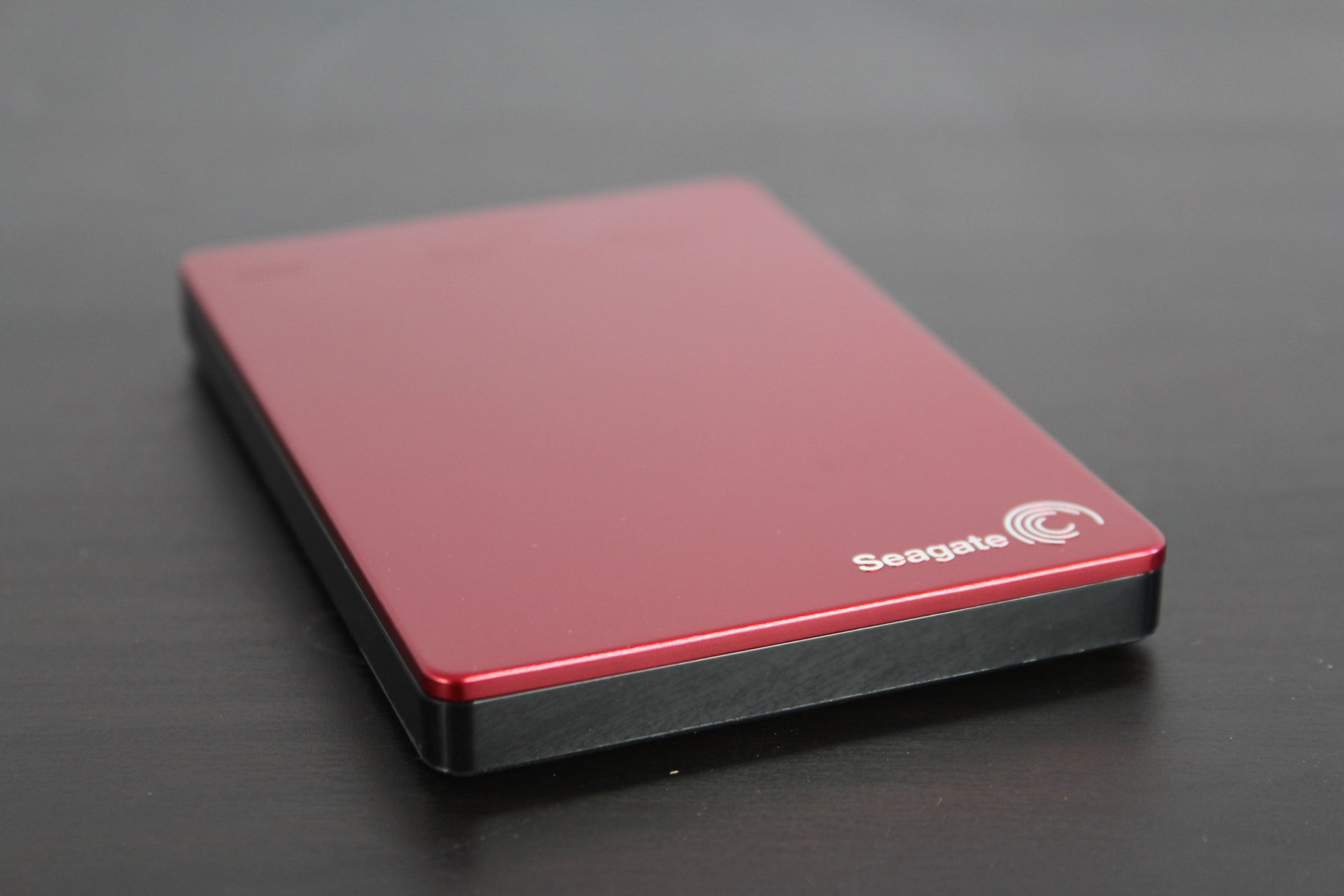
Key Features:
- £94.99 for 2TB
- Variety of colours
- 3.5-inch hard disk
The Seagate Backup Plus range comes in four varieties: Slim, Ultra Slim, Portable and Fast. The Portable drives are the largest in terms of both their physical dimensions and capacity, only available in 4TB and a whopping 5TB.
The 1TB Slim drive we were sent comes in capacities between 500GB and 2TB. Not everyone needs to carry hordes of media on an external hard disk. If it’s just to keep a backup of a precious portfolio, then you can save some cash by opting for an external hard disk with a smaller capacity; you definitely don’t need an SSD.
Our red unit is complemented by a white, blue, black and silver version. While the 12.1mm drive casing and two-tone design is simple, with a single colour covering the top side of the drive, the metallic flourish provides a slick finish.
Initial impressions of the software were disappointing, however. The setup process for the Seagate Dashboard software prompts for a system restart before it can be used, and greets the user with irritating pop-up prompts. It isn’t clear whether either is necessary for simple utility software.
But once installed, the software handles the basics for PC backup and restore well, and goes one further with its cloud integration, allowing one-click file synchronisation with Dropbox, Google Drive and One Drive.
Performance isn’t bad, either. It handles large files well, with 119MB/sec read speeds and 113MB/sec write burst speeds in CrystalDiskMark, confirmed by 102MB/sec reading and 111MB/sec writing in our real-world large file test. We were pleased to see decent results with small files too, with 82MB/sec read and 62MB/sec write scores.
A svelte and attractive design, performance that won’t let you down and reasonable value make this drive worth considering.
Apricorn Aegis Padlock SSD
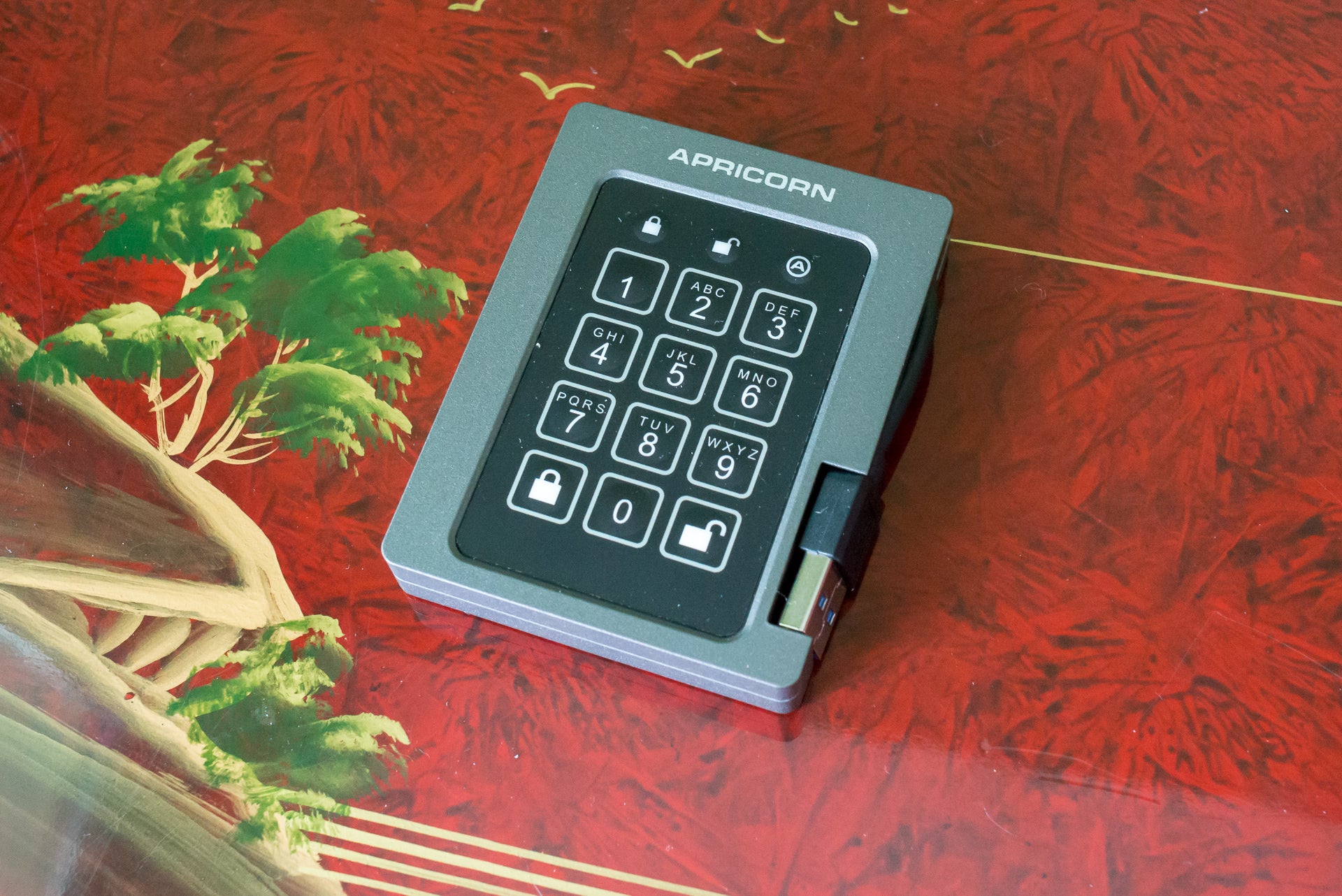
Key features:
- Available in 120GB, 250GB, 480GB, 1TB and 2TB capacities
- Three years RTB
- Review price: £285 (120GB)
The Apricorn Aegis Padlock SSD costs a staggering amount of money for a 120GB external hard drive. For this kind of money, you could easily buy a faster, larger capacity SSD from another manufacturer, so why bother then? The simple answer is, security.
As you may be able to tell from the keypad on the front of the drive, the Apricorn Padlock SSD is no ordinary SSD. This model supports hardware 256-bit AES encryption, so there’s no accessing the data without first inputting the correct PIN.
To prevent anyone trying to hack the hardware, the internals are covered in hardened epoxy. In other words, there’s no way of taking the SSD apart without causing loads of damage.
When you first connect the drive, you have to set an Admin PIN. This forces you to pick something unique, rather than having a default passcode that doesn’t get changed.
With the Admin PIN, you can configure the drive, including setting the Auto Lock feature, which shuts the drive down after five, 10 or 20 minutes when unattended. From the Admin PIN you should also create user PINs (up to four), which give access to the drive’s data but nothing else. With no display on the Padlock SSD, you’ll need the helpfully-written manual in front of you to get the drive configured.
The Padlock SSD connects via USB 3.0 to your computer, which limits its speed somewhat. In CrystalDiskMark, the sequential read speed of 186.4MBps and write speed of 179.8MBps are just 24% and 15% faster, respectively, than the best mechanical external hard drives. As there’s an SSD inside, the 4K random test is far faster here, at 18.37MBps read and 34.26MBps write.
Running the ATTO Disk Benchmark, file sizes between 128KB and 64MB returned read speeds between 186MBps and 205MBps, while write speeds fell between 164MBps and 179MBps. Smaller file sizes pushed the drive harder, and with 2KB files the Padlock SSD managed a Read speed of 36MBps and write speed of 46MBps.
That’s not bad, but the latest external SSDs that use USB 3.1 Gen 2 are a lot faster and can hit transfer speeds of more than 500MBps. Ultimately, it comes down to what you want. If it’s speed at a lower price, there are better alternatives; if you want your data to be absolutely safe, the Apricorn Padlock SSD is a good choice.


